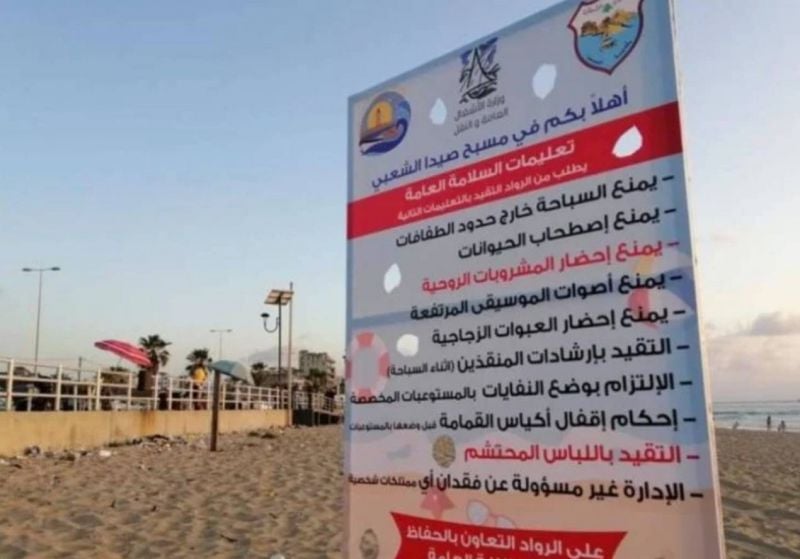
The sign installed by the municipality at the entrance of Saïda beach. (Credit: Mountasser Abdallah)
On May 14, at Saida’s public beach, some 30 men, accompanied by two sheiks, approached two couples of beachgoers. The men, who had assembled in mob fashion, were displeased with the women’s “indecent attire,” and ordered the couples to vacate the area.
The incident provoked reactions from religious leaders and civil society groups.
Two days later, Saida’s League of Muslim Ulama (religious scholars) denounced what it called a “ suspicious media campaign targeting the city, its customs, sheiks and population.”
In a press release, a group representing local religious associations also expressed discontent at the municipality’s lack of reactivity in enforcing order and law.
As the controversy escalated, opposing groups protested Sunday morning in front of Saida’s public beach. Dozens of security officers were deployed at the scene. One group of protesters, comprising feminist groups and activists, called for women’s freedom to choose their beachgoing attire, while the opposing Islamist group called for “modesty and virtue against nudity.”
The same day, the municipality issued its decision to ban swimsuits.
At the entrance to the public beach, the municipality of Saida placed a sign that stated in big bold letters, the ban of alcohol on the premises, as well as the requirement that beach-goers adhere to a standard of “decent attire.” In simpler terms, no alcohol and no swimsuits.
Amidst the rise of conservative religious movements, are such scenarios merely isolated events?
Growing conservative influence
“The decision to ban swimsuits is unprecedented in the history of Lebanon since the end of the Ottoman Empire,” historian and sociologist Waddah Charara told L’Orient-Le Jour.
In the 1970s, women and men used to swim together along Saida’s southern coast without an issue. This was before the sandy beach disappeared under the construction of a small marina, Charara recalled.
On the city’s northern shore, near the old citadel — a historically more conservative area — a military pool was built before the war, where everyone came to swim.
Charara, a native Saidonian well into his 70s, explained that the wind of freedom which once swept through the multi-faith city where Sunnis, Shiites, and Christians live side by side, was abruptly disrupted by the 1975-90 Civil War.
“The growing influence of religious associations and sheiks, but also of certain political parties, has pushed the municipality to take the decision to ban swimsuits and the consumption of alcohol on the public beach,” Charara explained.
Saida’s municipality head Mohammad Saoudi, who is close to Bahia Hariri’s political movement, and other members of the municipal council — which includes Shiites close to the Amal and Hezbollah — allegedly agreed to place the sign at the beach entrance after being pressured by certain conservative Islamist figures, but also for fear of reprisals.
Between 1989 and 1990, on two different occasions, fundamentalists blew up a restaurant on the road from Saida to Jezzine for serving alcohol, said Charara.
In 2012, Sheikh Ahmad al-Assir, affiliated with al-Qaeda, initiated action against Hezbollah and the Future Movement (headed by Saad al-Hariri), which resulted in violent clashes with the Lebanese Army.
Assir’s supporters vandalized and demolished statues and photographs of Maarouf Saad, the founder of the Popular Nasserist Organization (PNO). Saad was perceived as a “miscreant” due to his reputation for being excessively secular.
A society split in two
Chaouki Doueyhi, a sociologist and anthropologist, said during the civil war, fundamentalist Islamist movements imposed a ban on the sale and consumption of alcohol in various private establishments in Saida, as well as in Beirut and Tripoli.
“But the influence of conservative Islamists on public authorities is something new,” Doueyhi said in reference to the decision of the Saida municipality. “This trend is likely to grow.”
Over the past decade, Doueyhi, who was a professor at the University of Saint Joseph (USJ), said he witnessed the spread of extremist Islamist ideologies in Lebanon and elsewhere in the Arab world, which, according to him, benefit from significant funding.
“In the Bekaa and the South, society is already banishing certain social habits that are considered unbridled. It should come as no surprise to witness [new] clashes between the two opposing groups, as we saw in Saida last weekend,” he said.
“Society is split between two cultures, secular and religious and reconciliation seems far away.”
This article was originally published in L'Orient-Le Jour. Translation by Sahar Ghoussoub.